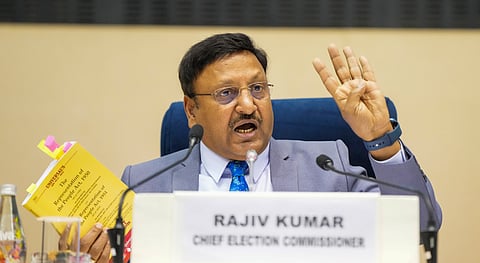

The Election Commission of India on Tuesday addressed several allegations related to EVM tampering and manipulation of voter turnout data in the last hours of the polling.
Responding to allegations of sudden jump in poll percentage post 5 pm, Chief Election Commissioner Rajiv Kumar claimed it is "impossible" to change voter turnout data.
The CEC claimed that a misconceived narrative is being spread about an increase in voting after 5 pm.
"Disclosure is our main pillar, detailed guidelines and datasets are available on our website," he said.
Kumar was addressing a press conference to announce the schedule for the Delhi Assembly elections.
Responding to allegations surrounding EVM tampering, Kumar, in his last press conference before his retirement on February 18, claimed that the voting machines are "not hackable."
"EVMs are commissioned only seven to eight days before polling day and candidates are kept informed through their agents at every step. Courts have ruled on 42 occasions that EVMs are not hackable... allegations of tampering with the machines are totally baseless," Kumar said.
Responding to claims regarding addition and deletion in voter lists, the CEC asserted that "due process was followed rigorously" and there was "no room for any manipulation."
"Every step of the electoral roll process is rooted in transparency and accountability. Deletion of names is not possible without adhering to strict protocols, and every party has the right to raise objections at various stages," he said.
Kumar also detailed the comprehensive process governing the maintenance of electoral roll.
For additions, names are included only after thorough foot-and-field verification by booth-level officers (BLOs), he said.
"Regular meetings are held with the representatives of political parties, who have the right to appoint booth-level agents (BLAs). Weekly lists of claims and objections are shared, and both draft and final rolls are published on the Election Commission's website. Polling station rationalisation is also carried out with the consultation of all the stakeholders," the CEC said.
On deletions, Kumar clarified that they are processed only through Form 7 or Form B, following strict guidelines.
"Mandatory field verification is conducted by the BLOs, and in cases where deletions exceed 2 per cent of a polling station's voter list, cross-verification is done. Deletions due to death require a certified death certificate, and a seven-day window is provided for objections after notices are published online. Also, the affected voters are given the opportunity for a personal hearing before their names are removed," he said.
"No deletion can occur without thorough documentation, field verification, and giving the concerned individual an opportunity to be heard," Kumar reiterated.
The CEC also pointed out that claims and objections are not only reviewed, but also shared with all the political parties and made accessible online to ensure transparency.
Criticising the tendency to question the integrity of the electoral process only during elections, the CEC argued that allegations of mass deletions are misleading without evidence and undermine public trust in the system.
"Where every vote matters, raising doubts about deletion of thousands of names without evidence is misleading. The processes we follow leave no room for manipulation," he stated.
The CEC's comments came in the backdrop of recent allegations made by Delhi Chief Minister Atishi, who claimed the voter list in the New Delhi Assembly constituency had been tampered with to influence the upcoming elections.
Kumar asserted that not a single discrepancy has been found in votes counted through EVMs and Voter Verifiable Paper Audit Trail (VVPAT) slips.
"Let me tell the nation today. After the Supreme Court mandated in 2019 that five VVPATs must be counted from each assembly constituency, over 67,000 VVPATs have been checked. This translates to more than 4. 5 crore (VVPAT) slips being verified. And let me assure you that not even the difference of one vote has been found with the new machines since 2019," he said.
The CEC also pointed out that any minor errors, such as technical glitches in some of the older machines or mock poll data not being cleared, are handled with precision.
"There could be instances where a machine's data is set aside during the counting process. However, these instances are reviewed thoroughly and the slips are counted if they could potentially impact the victory margin," he explained.
The CEC reiterated the transparency and robustness of the election mechanism, dismissing allegations of vote tampering.
"Our process is not only thorough but also transparent. Form 20, which contains the exact details of winners and losers, is handed over to all candidates," Kumar said.
The Election Commission has been subjected to scrutiny and demands for greater accountability, including the counting of all VVPAT slips, by opposition parties.